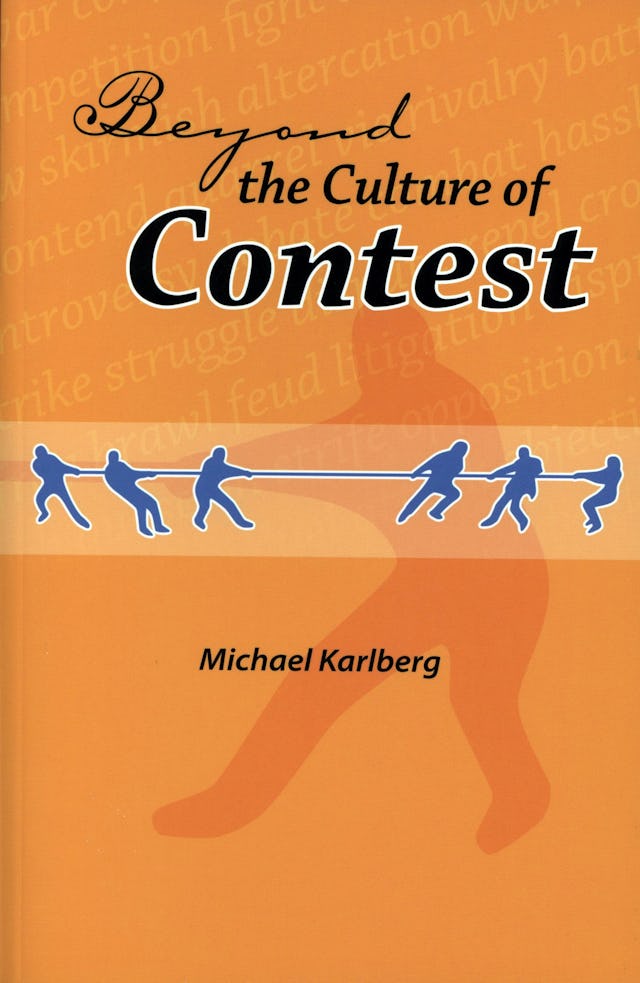How everyone can win
BELLINGHAM, WASHINGTON, United States — In Western countries, it is taken for granted that the best way to settle political, economic, or legal differences is by putting two or more sides together in a contest and letting one side win.
But the adversarial system has distinct flaws. There is always a "winner" and a "loser."
Somewhere along the line, compromises are usually made, which may not be in the best interests of the whole. And there is always the possibility -- and an increasing one as corruption of various forms creeps into the system -- that money or power will win out instead of truth or justice.
What if there is a better way?
Michael Karlberg's new book, "Beyond the Culture of Contest," calls into question the series of assumptions on which the adversarial system is based, asking whether they are not more products of culture than of our underlying nature.
It also offers a hopeful new model ("mutualism") in which non-adversarial decision-making could become the norm.
Dr. Karlberg, an assistant professor of communication at Western Washington University, criticizes the "assumption that contests are normal and necessary models of social organization."
In Western societies, he writes, there are three "core institutions" of society: politics, economics, and the legal system. Each is structured as a contest, he writes, designed to pit various parties, interests, or litigants against each other. And all three institutions are based on the notion of self-interest as the primary motivation.
"The political arena has been structured much like the capitalist free market," he writes. "It is an arena within which individuals, and the parties they construct, try to advance their particular ideals and interests in a self-interested and competitive manner."
The norm for adversarialism goes largely unquestioned, Dr. Karlberg adds, because it has become part of Western "culture." And that has occurred largely because of an assumption that human beings are by nature essentially selfish and aggressive.
The key to re-evaluating the culture of contest, then, is to re-evaluate our conception of human nature, Dr. Karlberg writes.
"Human beings appear to have the developmental potential for both conflict and cooperation," he writes. "Which of these potentials is more fully realized is largely a product of our cultural environment -- as demonstrated by the fact that different societies vary considerably in their expressions of conflict and cooperation."
Acknowledging that there will be a considerable number of skeptics who will remain wedded to the idea of contest, competition, and the efficiency of self-interest, Dr. Karlberg then examines various past and present forms of "mutualism."
In particular, he suggests that the various strands for a new kind of cooperative global culture are emerging in such areas as the feminist and ecological movements, modern systems and communications theories, and alternative systems for dispute resolution.
Ultimately, however, Dr. Karlberg suggests that none of these strands can be fully integrated without an overall change in our culture as a whole -- which, in turn, will require a re-conception of human nature and social structures.
What is needed, Dr. Karlberg writes, is "an alternative cultural formation" in which mutualism replaces adversarialism.
And he suggests a "case study" for such a model in the worldwide Baha'i community, "which has over a century of experience applying non-adversarial models...in an integrated and mutually reinforcing manner."
With some five million members, organized into local self-governing councils in more than 180 countries, Dr. Karlberg writes, the worldwide Baha'i community can be seen as a "vast social experiment that is testing the assumptions about human nature, social organization, and social change" that prevail in the adversarial system.
Dr. Karlberg, who is a Baha'i, notes that the Baha'i community follows a set of teachings that emphasizes cooperation, harmony, and unity.
Its institutional structures, he writes, are built around a non-partisan yet fully democratic electoral system that embodies non-adversarialism as one of its highest principles. In that system there are no nominations, no campaigning, and no underlying concept of interest groups or constituencies.
"The Baha'i electoral system embodies neither a contest nor the pursuit of power," he writes. "In contrast to partisan electoral systems the process is unifying rather than divisive. Since no one seeks election, there is no concept of 'winning.' At the same time, the electoral process remains eminently democratic."
Consultation
Dr. Karlberg also examines the principles of "consultation," the non-adversarial decision-making system that is used by all Baha'i institutions.
It seeks to "transcend the adversarial posturing and partisanship" and "patterns of negotiation and compromise" that mark traditional adversarial decision-making.
Dr. Karlberg writes that the history of the Baha'i community is, by and large, a history of individual self-sacrifice and dedication to collective interests, presenting a significant challenge to the assumption that human nature is incorrigibly selfish and aggressive.
Dr. Karlberg writes that the nature of global interdependence requires just such new modes of mutualism and cooperation in human endeavor.
"Because our reproductive and technological success as a species has led to conditions of unprecedented interdependence, no social group on the planet is any longer isolated," writes Dr. Karlberg.
"Under these new conditions, new strategies are not only becoming possible, they have become essential. An interdependent social body cannot coordinate its collective actions as long as its component members are locked in adversarial relationships."
Review by Brad Pokorny.
"Beyond the Culture of Contest: From Adversarialism to Mutualism in an Age of Interdependence" by Michael Karlberg. George Ronald. Oxford.
http://www.grbooks.com/
